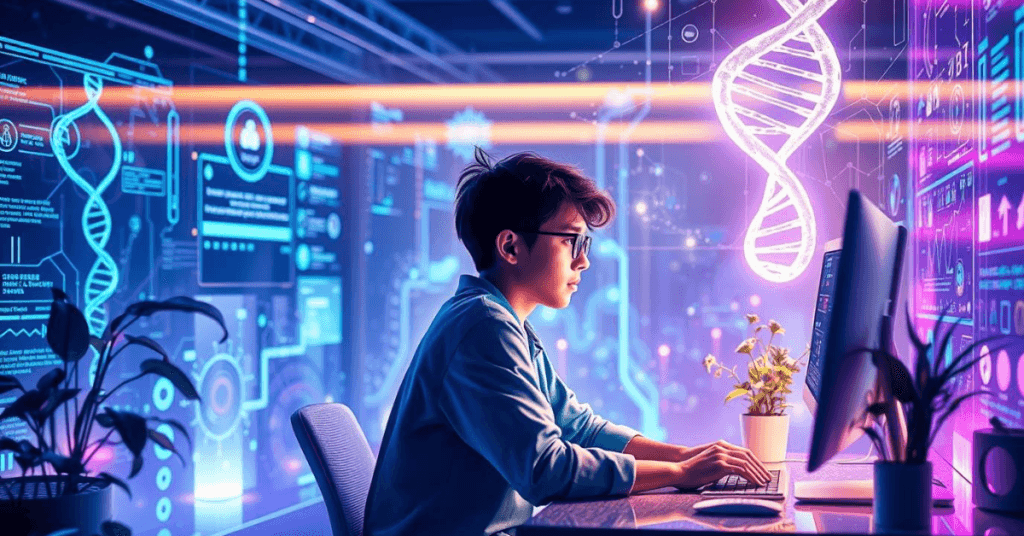If you’re a biology student staring at the AI hype, you might be wondering: “Can a biology student do artificial intelligence?” Spoiler alert: Yes, you can. In 2025, AI isn’t just for coders, it’s reshaping biology itself, from decoding genomes to fighting climate change. Your background isn’t a barrier; it’s a superpower. Let’s unpack how you can break into AI, what opportunities await, and how to get started with no tech degree required.
Why Biology and AI Are Teaming Up in 2025
AI thrives on data, and biology is a goldmine of it, think DNA sequences, protein structures, or ecosystem patterns. As a biology student, you’re already trained to analyze complex systems, making you a natural fit for AI’s problem-solving world.
Where Biology Meets AI
- Genomics: AI speeds up gene sequencing, spotting mutations in hours instead of weeks.
- Healthcare: Tools like AI diagnostics lean on bio-expertise to interpret results.
- Ecology: Algorithms track biodiversity or predict climate shifts – your field knowledge shines here.
In 2025, companies like DeepMind are pushing boundaries with projects like AlphaFold, which predicts protein structures which could be a game-changer for biology grads. Your role? Understanding the why behind the data AI crunches.

Do You Need a Tech Background to Jump In?
Short answer: No. AI might sound like a coding fortress, but it’s more accessible than ever. Can a biology student learn AI without programming skills? Absolutely, especially with today’s tools and resources.
Your Biology Skills Are Already AI-Ready
- Data Analysis: Mapping ecosystems or lab results? That’s the backbone of AI modeling.
- Research Mindset: Hypothesis-testing translates to tweaking AI algorithms.
- Problem-Solving: Biology’s complexity preps you for AI’s challenges.
You don’t need to be a math wizard either. Modern platforms handle the heavy lifting. The catch? A willingness to learn.
How to Transition From Biology to AI: Your Step-by-Step Plan
Ready to make the leap? Here’s how to go from petri dishes to neural networks.
Step 1: Start With What You Know
Your bio-knowledge is your edge. Ever studied gene expression? That’s data AI can predict. Focus on applying AI to what you already get.
Step 2: Pick Up AI Basics
No need to panic about coding. Start small:
- Python: Beginner-friendly and bio-relevant. Try Codecademy’s Python course (free tier available).
- No-Code Tools: Experiment with Teachable Machine – train AI models with clicks, not code.
- Bio-Specific: Biopython offers libraries for genomic projects.
Step 3: Find Your AI-Biology Niche
What grabs you? Here are hot areas for 2025:
- Bioinformatics: Use AI to analyze DNA or RNA datasets.
- Synthetic Biology: Design organisms with AI-driven simulations.
- Medical AI: Build tools for disease prediction or drug discovery.
Step 4: Show Off Your Skills
Create a mini-project like an AI model tracking plant growth and post it on GitHub. It’s your ticket to standing out.
Must-Know AI Skills for Biology Students
To thrive, blend your bio-roots with these AI essentials:
- Machine Learning (ML): Learn the basics of algorithms that “learn” from bio-data. Fast.ai’s free course is a great start.
- Data Visualization: Tools like Tableau turn messy bio-stats into clear insights.
- Statistics: Brush up via Khan Academy – it’s key for interpreting AI outputs.
In 2025, tools like Google Colab are making ML accessible, letting you run bio-projects online for free. No fancy setup needed.
Busting the “AI Is Only for Coders” Myth
Still on the fence? Let’s debunk some doubts.
“I’m Not Techy Enough. Can I Do This?”
Yes! AI’s user-friendly side is growing. Platforms like KNIME let you build workflows with drag-and-drop ease, no coding required.
“Will My Biology Degree Hold Me Back?”
Not at all. Employers in 2025 crave hybrid talent like people who get biology and AI. Your degree is a foundation, not a limit.
Top Resources to Get You Started
Here’s your toolkit for 2025:
Courses
- Stanford Online – AI in Healthcare: Perfect for bio-students, with real-world focus.
- Udemy – Python for Data Science: Affordable, hands-on, and bio-applicable.
- Coursera – AI for Everyone: No-code intro to AI concepts.
Tools
- Biopython: Free library for bio-AI coding.
- Google Colab: Run AI experiments online, no setup needed.
- RStudio: Stats powerhouse for bio-researchers.
Try one today. Most have free tiers to dip your toes in.
What’s the Payoff? Jobs and Opportunities in 2025
The AI-biology combo is hot. Recent trends show:
- Bioinformatics Analysts: $80K-$100K/year, with demand spiking as genomic data grows.
- AI Research Assistants: $60K-$90K, ideal for fresh grads.
- Healthcare AI Specialists: $100K+, blending bio and tech for innovation.
Companies like Illumina and Pfizer are hiring biology-AI hybrids for roles in drug development and precision medicine. Internships? Check Google Health or local biotech firms.
Your First Step: From Biology to AI Superstar
So, can a biology student do artificial intelligence? You’re not just capable, you’re needed. In 2025, AI is begging for people who understand life sciences to tackle its biggest challenges. Whether you’re a beginner curious about genomics or a pro eyeing healthcare AI, the path is yours to take.
Start small: try a free tool like Teachable Machine or sign up for Coursera’s AI for Everyone. Got a bio-AI idea like predicting coral reef health? Run with it. Your biology roots aren’t holding you back, they’re launching you forward.
What’s your next move? Drop it in the comments. I’d love to hear how you’re blending biology with AI!
Explore more at AIExplainedHere.com and stay ahead in the ever-evolving world of AI!



